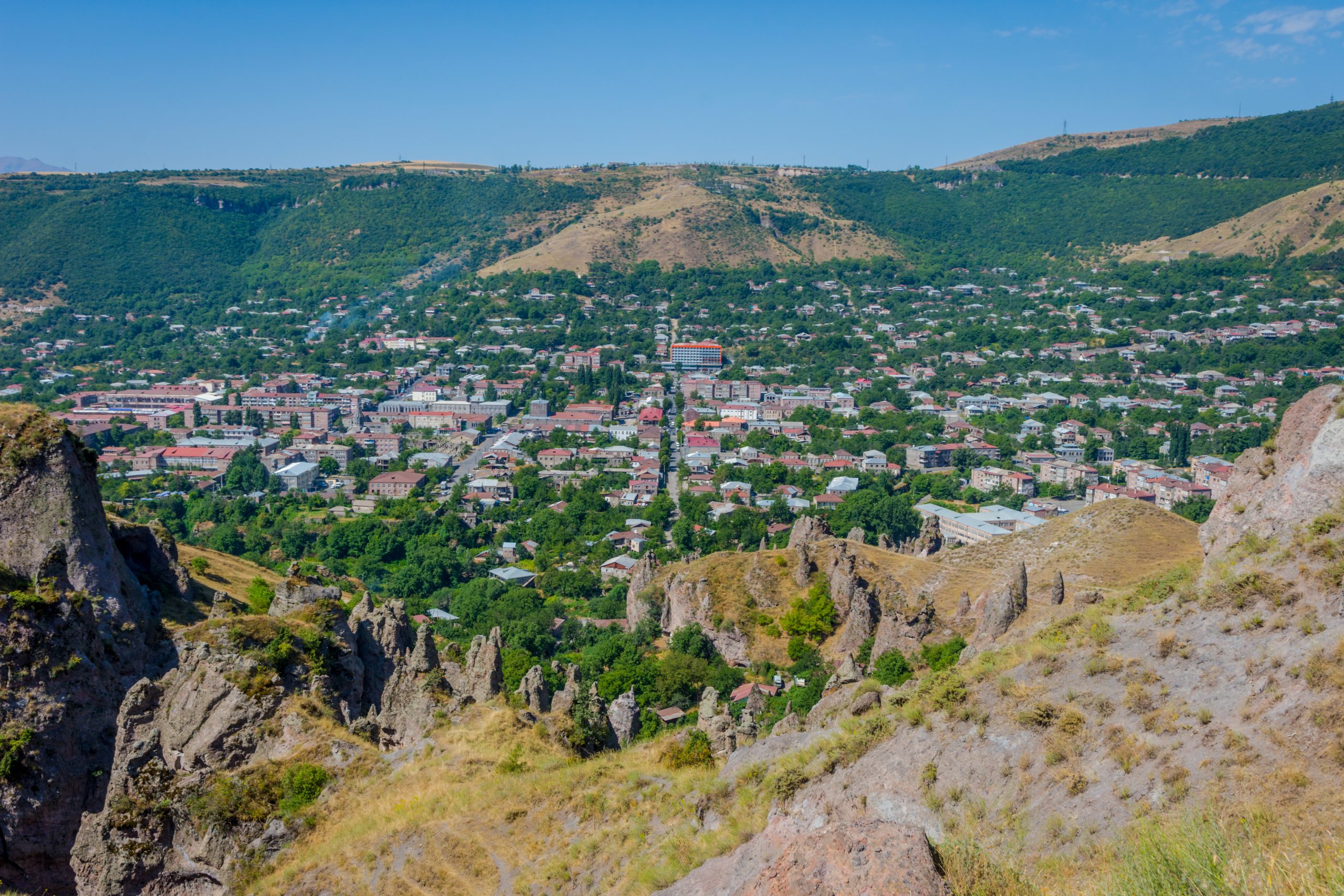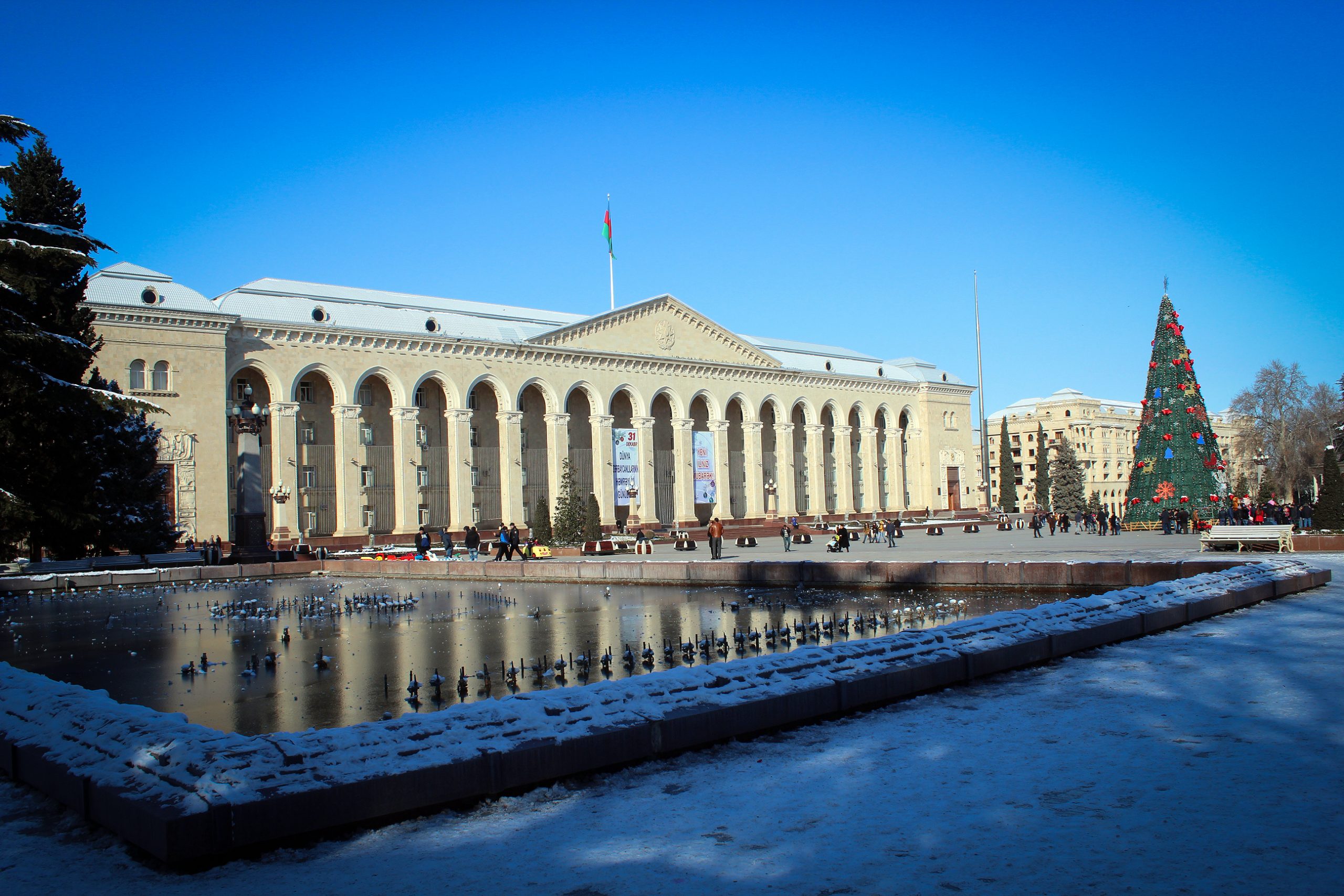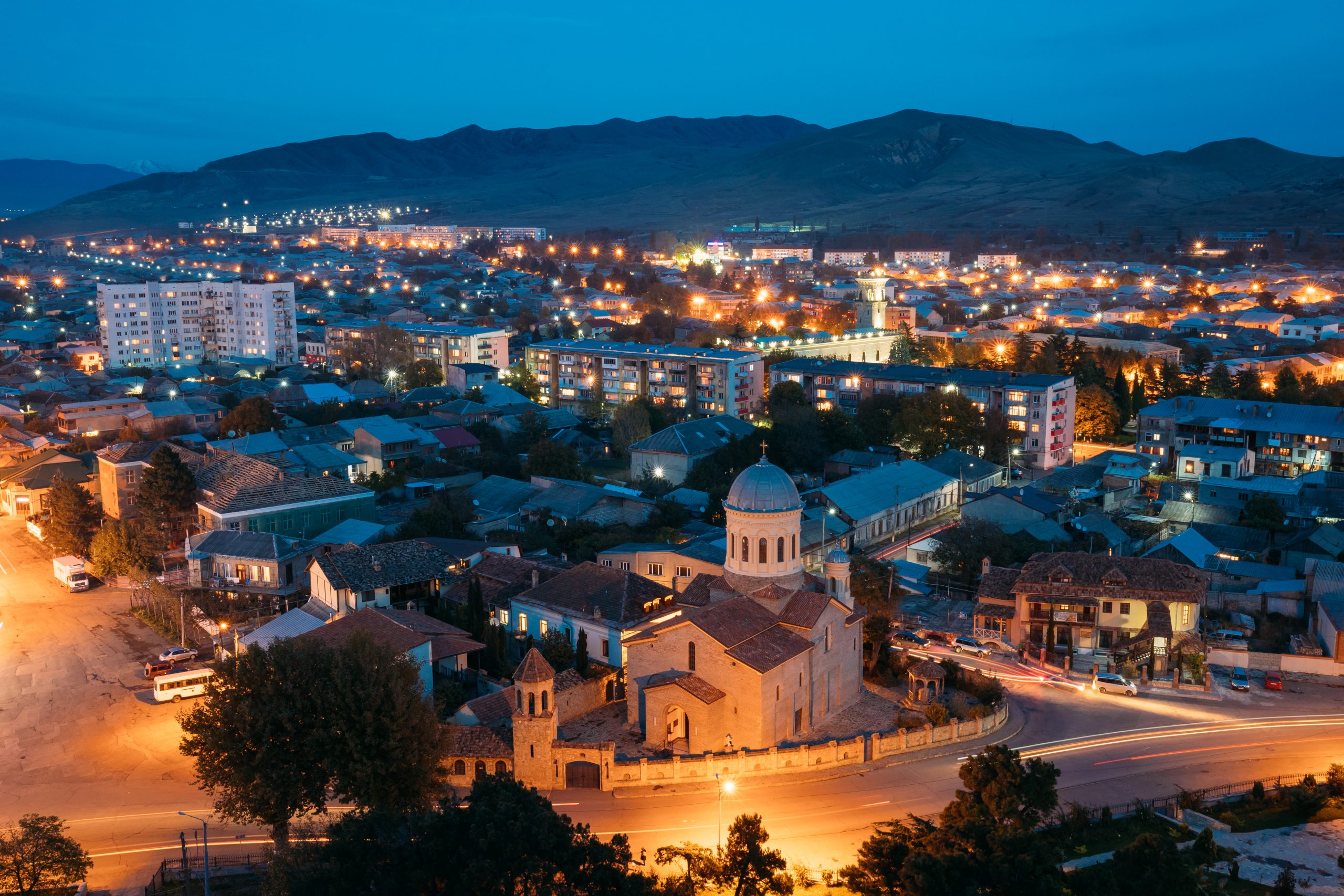Strategic Analysis Caucasus Brief
Bi-weekly review (7. – 21. 3. 2021)
Tomáš Baranec
Armenia

City Goris, Province Syunik, Armenia. Photo: Ana Flasker/ Shutterstock.com
Armenia to hold snap elections
Armenia will hold snap elections on June 20, 2021. Armenian Prime Minister Nikol Pashinyan made the announcement following the March 18 meeting with Gagik Tsarukyan, leader of the Prosperous Armenia faction.
“During the meeting, we agreed that early parliamentary elections are the best way out of the current domestic political situation. Taking into account the discussions I had with the President of the Republic of Armenia, with the My Step faction, with the leader of the Bright Armenia faction Edmon Marukyan, on June 20 of this year, special parliamentary elections will be held in the Republic of Armenia,” cites Public Radio of Armenia the statement on Pashinyan‘s Facebook page.
Just recently, on February 7, the ruling “My step party” announced that it will not pursue early parliamentary elections. “The prime minister’s proposal to hold snap parliamentary elections did not receive a positive response from the parliamentary opposition. There was no demand for the early elections among the general public, either,” claimed the ruling coalition at that time.
However, a recent poll from the International Republican Institute found otherwise: 55% of respondents said they were in favour of snap elections. Of those, 57% said the elections should take place this spring. A further 13% said they should take place by summer.
Not everyone in opposition is satisfied with this step. “Holding elections under Nikol Pashinyan or a proxy successor of his will lead to terrible consequences,” declared Vazgen Manukyan, the prime minister nominee of a coalition of opposition parties called the Homeland Salvation Movement at a March 15 rally.
Eduard Sharmazanov, a spokesperson for the Republican Party, accused Pashinian of “bluffing”. “When he resigns, then the Republican Party will discuss the possibility of participating,” he told reporters. As Eurasianet reminds, even Pashinyan’s political mentor, former president Levon Ter-Petrosyan, “recently weighed in to oppose elections conducted by the current authorities”.
“The prime minister and his political force, attempting to avoid responsibility for their disgraceful defeat, are guided not by concern for the consolidation of the state but solely by an obsession with maintaining power at all costs. If snap elections are organised by the ruling power, they will not shy away from the widespread use of administrative resources,” he said last month. “I am convinced that in that case, we will witness the most disgraceful elections in the history of Armenia. And that could mean the end of Armenian statehood,” cites Eurasianet the former president.
Sources:
- MEJLUMYAN Ani, „Eurasianet.org, Armenia to hold early elections“, https://eurasianet.org/armenia-to-hold-early-elections
- Public Radio of Armenia, „Armenia to hold snap elections on June 20“, https://en.armradio.am/2021/03/18/armenia-to-hold-snap-elections-on-june20/
Lebanese-Armenian Maral Najarin freed from the Azerbaijani prison
After four months of captivity in Azerbaijan, Lebanese-Armenian Maral Najarian was released on March 10. She immediately returned to Beirut.
“I received a phone call this morning when I was at the hospital, and I dropped my equipment after hearing the news of Maral’s release,” said Najarian’s sister, Sossi, who is a nurse at a local Beirut hospital. “I told them I am taking the day off and dashed home.” Najarian’s nephew Hovig Seferian told the Armenian Weekly that his aunt looked exhausted but relieved to be home.
Najarian, along with her sister Ani, repatriated to Nagorno Karabakh from Lebanon just before the start of the war on September 27. On November 9, Najarian told her sister that she was in Goris and would be heading towards an unrecognised republic to retrieve her belongings with her friend Viken Euljekjian, a fellow Lebanese Armenian.
That would be the last time the sisters would speak. Najarian and Euljekjian were kidnapped in Berdzor by the Azerbaijani Armed Forces. Euljekjian is still in captivity.
Sources:
- Asbarez, “Maral Najarian Released from Azerbaijani Captivity“, https://asbarez.com/201033/maral-najarian-released-from-azerbaijani-captivity/
- GHAZANCHYAN Siranush, Public Radio of Armenia, https://en.armradio.am/2021/03/11/armenian-maral-najarian-released-from-azerbaijani-captivity/
Armenia to temporarily receive gas via Azerbaijan
Russian gas supplies to Armenia will be temporarily carried out through Azerbaijan in connection with the repair of the North Caucasus-Transcaucasia gas pipeline (via Georgia), informs Azerbaijani press agency Turan.az.
„During the scheduled preventive maintenance work on the North Caucasus – Transcaucasia gas pipeline, Russian gas will be supplied to consumers in Armenia through the territory of Azerbaijan. On March 16, Gazprom Export and the State Oil Company of the Azerbaijan Republic signed a short-term contract for the transportation of Russian gas through the territory of Azerbaijan,“ the Russian supplier wrote in its statement.
Sources:
- Turan.az, „Armenia to Receive Gas through Azerbaijan for Three Weeks“, https://www.turan.az/ext/news/2021/3/free/politics_news/en/2301.htm
Armenia and Azerbaijan held mirroring military exercises
From March 16, 2021, various units of the Armenian Armed Forces held military exercise connected with the live-firing. The exercise included altogether 7.500 soldiers, including Special Forces units, about 100 tanks and armoured vehicles, and 300 pieces of artillery and anti-aircraft systems as well as aircrafts. The exercise concluded on March 20.
Armenian exercise mirrored the Azerbaijan Armed Forces exercise that took place from March 15 – 19, 2021. Azerbaijani exercise was supposed to involve around 10.000 troops and 100 pieces of various types of military equipment. The goal of the exercise was declared as to train the combat in „mountainous conditions“.
Azerbaijani exercise, coupled with the recent bellicose rhetorics of President Aliyev, sparked fears of potential re-ignition of the war conflict between the two regional rivals that signed the cease-fire agreement just November 9, last year. Armenia’s snap military exercise was a reaction to Azerbaijan’s one, probably in order not to get caught unprepared amid the internal political crisis also involving the country’s top military brass.
Sources:
Azerbaijani authorities detain peaceful activists on International Women’s Day
An unsanctioned rally to celebrate International Women’s Day on March 8 was dispersed by the police in Baku after a group of women had met to raise awareness of women’s rights. Authorities had announced earlier during the week that permission to hold such a march was denied and that police would prevent illegal gatherings.
According to Meydan TV, following a call on social media to protest against domestic violence and gender inequality, a group of women met at the “Statue of a Liberated Woman” in Baku’s city centre, close to Nizami metro station. They intended to march to the statue of poet Khurshidbanu Natavan, a 20-minute walk away.
“For the third year in a row, the Azerbaijani authorities have cracked down on the International Women’s Day march, rejecting organisers’ permit application, detaining activists, and shutting down public transportation in a brazen violation of the freedom of assembly,” said Marc Behrendt, director of Europe and Eurasia programs at Freedom House. “The voices of women must be heard in Azerbaijan, where domestic violence, femicides, and other grave forms of gender-based violence are commonplace, and where female activists and journalists are harassed and ignored, with no effective national policy response from the government,” she added.
As the Freedom House warns in this context, the latest crackdown occurred amid a surge in reporting on suicides by women, notably the case of Sevil Atakishiyeva, which sparked a social media campaign blaming feminism for her death. Commenters on the television network ATV directly blamed an Azerbaijani feminist activist, Gulnara Mehdiyeva, for Atakishiyeva’s death. Furthermore, recordings of private conversations between Mehdiyeva and a friend were leaked on social media to smear the activist. The hacking of Mehdiyeva’s online accounts was allegedly traced to a state-sponsored individual who had previously leaked compromising information about human rights defenders and independent journalists.
Sources:
- MeydanTV, „Baku police disperse rally on International Women’s Day“, https://www.meydan.tv/az/article/international-womens-day-in-azerbaijan/
- Freedom House, „Azerbaijan: Authorities Detain Peaceful Activists on International Women’s Day“, https://freedomhouse.org/article/azerbaijan-authorities-detain-peaceful-activists-international-womens-day
Opposition blogger severely stabbed in France
Azerbaijani opposition blogger Mohammed Mirzali, who lives in France, was attacked by a group of unknown persons who stabbed him several times. Mirzali was attacked in Nantes on March 14. As a result of the attack, the blogger had to be hospitalised in serious condition. Another Azerbaijani political emigrant Emin Akhmedbekov told the Caucasian Knot that assailants tried to cut off Mirzali’s tongue.
„Muhammad Mirzali is one of the critics of the Aliyev regime. He lives in Nantes. He was already shot on October 6, 2020. Three bullets hit the inside of his car, one hitting his arm. The attackers have not yet been found. On March 14, in the centre of Nantes, at about 14 -15 o’clock, six people attacked him again, beaten him and cut him. They tried to cut off his tongue, but he did not unclench his teeth. Instead, they cut him in the face, neck, mouth, wounded his legs, belly, back, cut his fingers. But they did not kill him. Until three o’clock at night, he was at the operation. Now he is in intensive care in serious condition. Mirzali’s mother told me all these details,“ Akhmedbekov said. The investigation is underway.
As the Caucasian Knot reminds, back in 2018, Mirzali, together with the bloggers Ordukhan Temirkhan and Tural Sadygly held a protest campaign in social networks entitled „Let’s Tell About Dictator“, timed to the appointment of the early presidential election in Azerbaijan and the nomination of Ilham Aliyev.
Sources:
- Caucasian Knot, “Оппозиционный блогер из Азербайджана ранен во Франции (Opposition blogger from Azerbaijan wounded in France)”, https://www.kavkaz-uzel.eu/articles/361768/
- Caucasian Knot, „Нападение на Мирзали продолжило серию инцидентов с политэмигрантами из Азербайджана (With the attack on Mirzali continues a series of incidents with political emigrants from Azerbaijan)“, https://www.kavkaz-uzel.eu/articles/361799/
- Caucasian Knot, Oppositional Azerbaijani blogger wounded in France, https://www.eng.kavkaz-uzel.eu/articles/54953/
HRW: Armenian POWs abused in Azerbaijani custody
International non-governmental organisation Human Rights Watch (HRW) urged the Azerbaijani government to investigate abuse against Armenian prisoners of war (POWs) in its March 19 statement.
The organisation claims Azerbaijani forces abused Armenian POWs from the 2020 Nagorno-Karabakh conflict, subjecting them to cruel and degrading treatment and torture either when they were captured, during their transfer, or while in custody at various detention facilities calling on the Azerbaijani government to investigate all allegations of ill-treatment.
“The abuse, including torture of detained Armenian soldiers, is abhorrent and a war crime,” said Hugh Williamson, Europe and Central Asia director at Human Rights Watch. “It is also deeply disturbing that a number of missing Armenian soldiers were last seen in Azerbaijan’s custody, and it has failed to account for them.”
HRW interviewed four former POWs who detailed their ill-treatment in custody as well as the ill-treatment of other POWs with whom they were captured or shared cells and analysed similar videos published on social media.
Meanwhile, approximately dozens of Armenian POWs are still being held in Azerbaijan as „terrorism suspects”. The exact numbers vary from source to source.
Sources:
- Human Rights Watch, „Azerbaijan: Armenian POWs Abused in Custody“, https://www.hrw.org/news/2021/03/19/azerbaijan-armenian-pows-abused-custody
Scandalous recordings imply the privatisation of security forces by Bera Ivanishvili
Georgian Prime Minister Irakli Gharibashvili is facing fresh calls to resign after recordings emerged in which he appears to agree to send police officers to intimidate critics of Bera Ivanishvili. Son of éminence grise of the Georgian politics – oligarch Bidzina Ivanishvili. The scandalous recording was first made public by the Pirveli TV station on March 6.
From the recordings, it appears that the young rapper instructs Gharibashvili and other officials to punish people who had insulted him on Facebook. In the tapes, Bera and Gharibashvili discuss several planned or already executed acts of revenge against those who offended the musician, including intimidation and physical violence, including one minor.
As OC Media informed, in one of the leaked tapes aired on TV Pirveli’s Nodar Meladze’s Saturday programme, Bera Ivanishvili is heard apparently instructing Anzor Chubinidze, the head of The Special State Protection Service of Georgia (SSPS) since late 2014, to retaliate against a 23-year-old called “Lado”, who he said had offended him and his family in a comments section on Facebook.
„Let’s decide first if we want or don’t want him to apologise to us on Facebook“, Anzor Chubinidze asks Bera in one conversation. “We want him to apologise”, Bera Ivanishvili replies. Chubinidze then unenthusiastically commits to visiting his family. Chubinidze later confirms to Bera that he and his men visited Lado’s family.
The scandal comes amidst a political crisis in Georgia over the conduct and results of October’s parliamentary elections. Leader of the opposition Lelo for Georgia party and co-founder of the TBC Bank Mamuka Khazaradze, immediately called for the resignation of the newly appointed PM Gharibashvili as well as Chubinidze. He was soon followed by Gigi Ugulava, one of the leaders of the opposition European Georgia party.
The ruling party has not disputed that the recordings are actual but have insisted the story was „fabricated“ using misleading editing. The Prime Minister broke his silence on March 12, claiming recordings prove him being “the victim” of massive surveillance by the previous administration. He said the recordings are “a fabrication from 11 years ago,” splicing together series of telephone conversations.
An investigation has been launched into the „unauthorised recording and/or interception of private conversation, as well as the recording of private communication, illegal use and dissemination of information obtained through technical means, on the grounds of Article 158, Parts 1 and 2 of the Criminal Code of Georgia“, reads the March 9 statement by the Prosecutor’s Office of Georgia in connection with leaked recordings.
Sources:
- KINCHA Shota, OC Media, “Calls for Georgian PM’s resignation follow scandalous recordings”, https://oc-media.org/calls-for-georgian-pms-resignation-follow-scandalous-recordings/
- KINCHA Shota, OC Media, “Slew of witnesses accuse Bera Ivanishvili of terrorising critics“, https://oc-media.org/slew-of-witnesses-accuse-bera-ivanishvili-of-terrorising-critics/
- MALINBOYN Veronika, The Messenger Online, „Opposition Lelo and European Georgia parties demand PM Garibashvili’s resignation“, http://messenger.com.ge/issues/4849_march_8_2021/4849_veronika1.html
- Civil.ge, „PM Garibashvili Breaks Silence Over Covert Recordings“, https://civil.ge/archives/405292
- Georgia Today, „Prosecutor’s Office Launches Investigation into the Bera Recordings“, https://georgiatoday.ge/prosecutors-office-launches-investigation-into-secret-recordings/
Political deadlock ends in South Ossetia after the appointment of a new PM
The de facto parliament of Georgia’s breakaway region of South Ossetia has approved a new figure to lead the next government, ending nearly six months of political deadlock and an opposition boycott.
As RFE/RL reported, South Ossetia’s de facto president, Anatoly Bibilov, issued a decree on March 12 making Gennady Bekoyev the region’s prime minister after a majority of lawmakers agreed to his candidacy.
In a secret vote, 19 deputies voted for Bekoyev, 11 voted against him, and one deputy abstained. The 39-year-old Bekoyev was previously de facto deputy prime minister and economic development minister.
The Moscow-backed breakaway region of Georgia has been in a political crisis since the previous government resigned in August in the wake of protests over the death of a 28-year-old Inal Dzhabiev from injuries sustained while in police custody.
In connection with the tragic case, the opposition deputies sought the resignation of the prosecutor general, boycotting the meetings since the fall of 2020. The work of the parliament was paralysed, but in February, the speaker of the parliament, using the interpretation of the laws given by the Prosecutor General’s Office, said that meetings could be held without a quorum. On February 16, this is how the South Ossetian budget for 2021 was adopted. The opposition, meanwhile, considers holding meetings without a quorum a violation of the Constitution.
On the following day, after approving the new PM, opposition MPs filed a repeated complaint with the Supreme Court for approval of the South Ossetian budget without a quorum. They insist on punishing those guilty of gross violation of the rules of parliamentary sessions but added they consider it wrong to continue the boycott in such a situation.
„Yesterday’s session was held following the regulations. That is, the form of a secret ballot when approving the candidacy of the Prime Minister was held in accordance with the regulations. When the budget was adopted, the regulations were not taken into account,“ opposition PM David Sanakoev explained the situation.
Sources:
- RFE/RL, „Political Deadlock Ends In Georgia’s Breakaway South Ossetia“, https://www.rferl.org/a/georgia-south-ossetia-new-prime-minister/31149971.html
- Caucasian Knot, „Правительство Южной Осетии возглавил Геннадий Бекоев“
(The government of South Ossetia is headed by Gennady Bekoev), https://www.kavkaz-uzel.eu/articles/361698/ - Caucasian Knot, „Оппозиция сочла бессмысленным дальнейший бойкот заседаний парламента Южной Осетии“ (Opposition considers further boycott of parliamentary sessions of South Ossetia senseless), https://www.kavkaz-uzel.eu/articles/361734/



Contact us